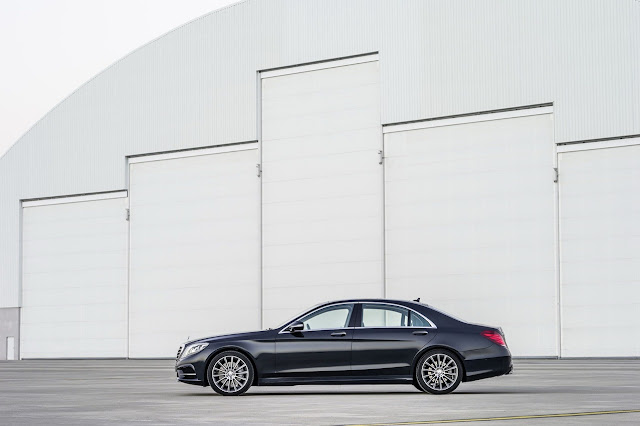
Take a moment and scroll down to see all of the photos of the all-new Mercedes-Benz S-Class, so that you can more clearly put into perspective what you will read here. This car will influence the luxury sector starting now and until it is replaced by an all-new model somewhere around the year 2020 (wonder what that’s going to be like?).
As you’re probably expecting, it’s packed with electronic gadgets, one more useful than the next. It’s all very safe, green and innovative, while also being wrapped in one of the prettiest bodies Mercedes has made in a while.
The restrained design is backed up by excellent proportions, which are emphasized by the deep side creases. It is a very different car than the one it replaces, but since it must also bridge the gap left in the lineup after Mercedes gave up on Maybach, it feels even more premium than the outgoing model that is still considered a class leader in many respects even today, despite being an 8-year-old model.
So what does the new S-Class bring to the segment? Well, aside from the headlights (full-LED with 56 diodes each), which have an odd shape, we say it’s design is quite successful and very modern - its sleek profile grants it another advantage in making it the most aerodynamically-efficient S-Class ever (Cd 0.24).
Also, despite having a sloping roofline and tapering rear, it benefits in driver and passenger space all-round, with rear occupants gaining an extra 14 mm of legroom.

The interior is still one of the key selling points for the W222-codenamed S-Class, and Mercedes has managed to bringing something new here, as well. It is very clean and architectural in its design, looking more like than that of a Bentley than anything else, with few visible buttons – most of the functions can be controlled via a central rotary knob. The steering wheel has only two columns and a limited number of buttons.
The features you can now get with the flagship are simply astonishing. The heated armrests still sound a bit strange to us, but give it a few years and you’ll get it as standard from Volvo, or some other cold-conscious manufacturer… How about the camera system that monitors the road, pre-adjusting the suspension to cope with changing conditions or imperfections, and adapting on the fly? There’s also inflatable rear seatbelts – you now strap yourself into the bag, instead of waiting for it to cushion your impact with anything hard…
So far, we only have information on the European lineup of engines, which consists of the S400 Hybrid, S500, S350 BlueTec and S300 BlueTec Hybrid. The first two variants run on gasoline; one is a 3.5-liter V6 hybrid with 302 hp and an electric boost of 20 kW (27 hp), while the other is a 4.7-liter V8 with 448 hp – it pushes the car to 62 mph (100 km/h) in 4.8 seconds. The other two variants are the diesels, and while the S350 is pretty straightforward, featuring a 3.0-liter diesel with 254 hp, it’s the other variant that’s the most interesting.
The S300 BlueTec Hybrid uses the same 2.1-liter four-cylinder engine as the old but unsuccessful S250 CDI. However, here it is boosted by the same 20 kW electric motor as S400 Hybrid. This means it can do 150 mph (240 km/h), hit 62 mph (100 km/h) in 7.6 seconds and return a claimed 4.4 l/100km at the same time – this equates to 64.2 mpg UK or 53.4 mpg US, and it’s the last of a very impressive set of figures and features. There’s a lot more we could say about the new S-Class, but we will probably break that down into separate pieces which we will post once we ourselves completely get our heads around it.
By Andrei Nedelea


 Peugeot 308 Hatchback Breaks All-new and important Cover
Peugeot 308 Hatchback Breaks All-new and important Cover BMW Set New Guinness World Record DriftCover
BMW Set New Guinness World Record DriftCover BMW Set New Guinness World Record DriftCover
BMW Set New Guinness World Record DriftCover
 Chris Harris Drives Porsche’s New 918 Spyder Hybrid
Chris Harris Drives Porsche’s New 918 Spyder Hybrid  This Is How You Kill a Maserati Quattroporte with Sledgehammers...
This Is How You Kill a Maserati Quattroporte with Sledgehammers... Beautiful Bodied 1963 Corvette Rondine Pininfarina Looking for a new owner
Beautiful Bodied 1963 Corvette Rondine Pininfarina Looking for a new owner Mercedes E400 Cabriolet
Mercedes E400 Cabriolet